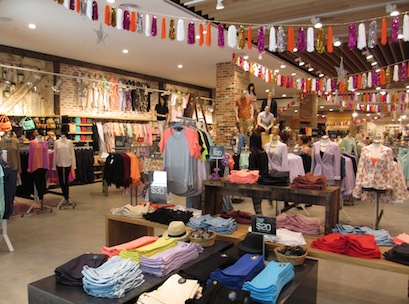 Australia may be an island nation, thousands of kilometres removed from global epicentres of commerce like London, Paris and New York, but in today’s economy, there are no borders.
Australia may be an island nation, thousands of kilometres removed from global epicentres of commerce like London, Paris and New York, but in today’s economy, there are no borders.
Goods travel the world to be transformed from raw materials to finished products. Fashion trends are broadcast at the speed of light through live-streamed runways. Even consumer behaviour is influenced by faraway events.
Consider the sales events Black Friday and Cyber Monday. Both originated in the US, where Thanksgiving, which is held on the fourth Thursday in November, marks the start of the Christmas shopping season.
US-based retailers have traditionally offered big discounts on the Friday after Thanksgiving, when many Americans take the day off work and go shopping. Over time, it morphed into the biggest sales event of the year and became known as Black Friday.
In recent years, the event has expanded in both directions, with some retailers starting to discount on or even before Thanksgiving, and most prolonging their sales over the weekend to merge into the online version, Cyber Monday.
At the same time, Black Friday became a global phenomenon, as overseas consumers enabled by ecommerce realised they could also snag a deal. Not wanting to be left out in the cold, global retailers have started to offer their own Black Friday/Cyber Monday sales.
In just the last two years, Black Friday has outpaced homegrown sales events like Click Frenzy in Australia and Boxing Day in the UK, according to new research from Adobe Analytics.
Last year, a significant number of Australian retailers, including ASOS, Kogan, The Iconic, Stylerunner, Red Balloon and Ebay, as well as bricks-and-mortar stalwarts, Myer and David Jones, slashed their prices on Black Friday. Experts say even more retailers will jump on the bandwagon this year.
Martin Corr, co-founder of e-commerce consultancy, Periscope, and former global marketing director of online surfwear retailer, Surfstitch, says he is working with clients to capitalise on Black Friday/Cyber Monday in Australia.
“There’s been a dramatic increase in the importance of the sales event in Australia over the last four to five years. What we’re seeing now is larger businesses like Myer and David Jones bring [Black Friday sales] into their commercial calendar,” Corr tells IRW.
Up to 50 per cent off
Cotton On Group has been offering Black Friday discounts to Australian customers since 2014 and will do so again this year, according to Michael Hardwick, chief financial officer of Cotton On Group.
“Across our network of over 700 stores in Australia, plus our newly launched Cotton On & Co ecommerce website, we will be offering up to 50 per cent off across our seven brands, in addition to a host of activations and giveaways that take place in various store locations around the world,” Hardwick tells IRW.
Cotton On Group raked in $35 million globally on Black Friday last year. Hardwick says the company hopes to achieve double-digit growth this year.
“Globally, we know our customers are looking for unique and affordable gifting solutions in the lead up to Christmas, and as such, we are looking forward to bringing gifting and personalisation to them in a big way during the four-day shopping holiday and anticipate four million products to fly off the shelves,” he says.
Toys ‘R’ Us Australia is also participating in Black Friday and Cyber Monday for the fourth time this year. The toy retailer will offer in-store and online deals across categories that are “fairly aggressive”, according to head of ecommerce, Tim Halaska.
“We’re discounting large-scale outdoor items, baby products, dolls, car sets. It’s not one store-wide offer, but there will be great bargains on key items. It’s the launch of the Christmas period for us,” he tells IRW.
Halaska says the sales event has gained considerable traction since the toy retailer first introduced the concept to local shoppers in 2014.
“2014 was pretty quiet. We thought we would just give it a try. Last year, we really saw it grow year-on-year. Customers know what it is and are expecting it now,” he says.
Look before you leap
Retail Oasis consultant Pippa Kulmar says retailers need to think carefully about the pros and cons of introducing Black Friday/Cyber Monday to their customers.
“There are a bunch of questions I would ask myself before deciding to participate. Is having a Black Friday sale appropriate to your brand? If you’re a mass retailer that competes on price, it’s probably the right strategy for you,” Kulmar tells IRW.
“If not, you have to ask yourself if you want to participate by discounting or adding value. Maybe you give a gift with purchase.”
Persicope’s Corr agrees that retailers should be strategic in their offers, such as only offering discounts above a certain minimum spend, or changing the threshold for free shipping to increase the average order volume.
“One thing we’ve seen is that businesses get all their best products burnt through – products that they could have sold before or after [the sale] at a higher margin. So one tactic is to not put all your best product up in that period,” he says.
“The challenge is that consumers are driving the demand for it and their expectation is for widespread and deep discounts. Lots of retailers are doing similar things, like 25 or 30 per cent off site-wide. There’s an opportunity to be more creative.”
Corr points to the US, where outdoor retailer REI has closed for business on Black Friday for the past two years, encouraging customers instead to ‘opt outside’. Patagonia donates 100 per cent of its sales on Black Friday – not profits – to grassroots environmental organisations.
“It’s a really cool, bold thing to do. I think the bar is still to be set for an omnichannel retailer or a pureplay in Australia to take a stand and say we’re going to do something different,” Corr says.





